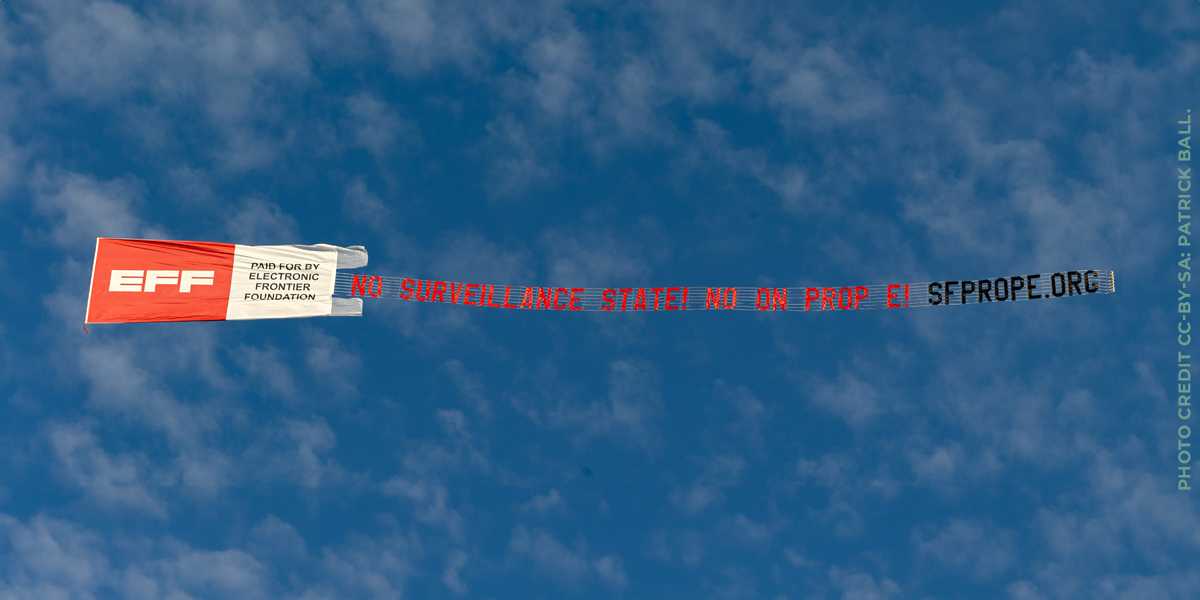Proposition E, which San Franciscans will be asked to vote on in the March 5 election, is so dangerous that last weekend we chartered a plane to inform our neighbors about what the ballot measure does and urge them to vote NO on it. If you were in Dolores Park, Golden Gate Park, Chinatown, or anywhere in between on Saturday, there’s a chance you saw it, with a huge banner flying through the sky: “No Surveillance State! No on Prop E.”
Despite the fact that the San Francisco Chronicle has endorsed a NO vote on Prop E, and even quoted some police who don’t find its changes useful to keeping the public safe, proponents of Prop E have raised over $1 million to push this unnecessary, ill-thought out, and downright dangerous ballot measure.
San Francisco, Say NOPE: Vote NO on Prop E on March 5
What Does Prop E Do?
Prop E is a haphazard mess of proposals that tries to capitalize on residents’ fear of crime in an attempt to gut commonsense democratic oversight of the San Francisco Police Department (SFPD). In addition to removing certain police oversight authority from the civilian-staffed Police Commission and expanding the circumstances under which police may conduct high-speed vehicle chases, Prop E would also amend existing law passed in 2019 to protect San Franciscans from invasive, untested, or biased police surveillance technologies. Currently, if the SFPD wants to acquire a new technology, they must provide a detailed use policy to the democratically-elected Board of Supervisors, in a process that allows for public comment. The Board then votes on whether and how the police can use the technology.
Prop E guts these protective measures designed to bring communities into the conversation about public safety. If Prop E passes on March 5, then the SFPD can unilaterally use any technology they want for a full year without the Board’s approval, without publishing an official policy about how they’d use the technology, and without allowing community members to voice their concerns.

Why is Prop E Dangerous and Unnecessary?
Across the country, police often buy and deploy surveillance equipment without residents of their towns even knowing what police are using or how they’re using it. This means that dangerous technologies—technologies other cities have even banned—are being used without any transparency, accountability, or democratic control.
San Franciscans advocated for and overwhelmingly supported a law that provides them with more knowledge of, and a voice in, what technologies the police use. Under current law, if the SFPD wanted to use racist predictive policing algorithms that U.S. Senators are currently advising the Department of Justice to stop funding or if the SFPD wanted to buy up geolocation data being harvested from people’s cells phones and sold on the advertising data broker market, they have to let the public know and put it to a vote before the city’s democratically-elected governing body first. Prop E would gut any meaningful democratic check on police’s acquisition and use of surveillance technologies.
What Technology Would Prop E Allow Police to Use?
That’s the thing—we don’t know, and if Prop E passes, we may never know. Today, if the SFPD decides to use a piece of surveillance technology, there is a process for sharing that information with the public. With Prop E, that process won’t happen until the technology has been in use for a full year. And if police abandon use of a technology before a year, we may never find out what technology police tried out and how they used it.
Even though we don’t know what technologies the SFPD is eyeing, we do know what technologies other police departments have been buying in cities around the country: AI-based “predictive policing,” and social media scanning tools are just two examples. And according to the City Attorney, Prop E would even enable the SFPD to outfit surveillance tools such as drones and surveillance cameras with face recognition technology. San Francisco currently has a ban on police using remote-controlled robots to deploy deadly force, but if passed, Prop E would allow police to invest in technologies like taser-armed drones without any oversight or potential for elected officials to block the sale.



